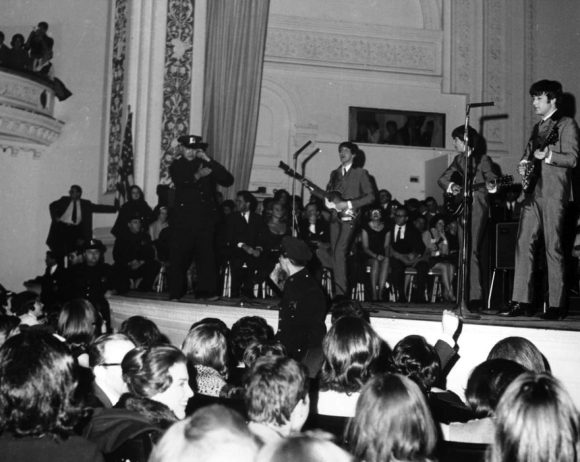After an overnight stop in Washington, DC, The Beatles returned to New York City for two concerts at Carnegie Hall on 12 February 1964.
The train journey from Washington took two hours, but once back in New York their limousine was unable to pass through the waiting crowds. A public holiday held to commemorate Abraham Lincoln’s birthday allowed an estimated 10,000 people to turn up to greet them at Penn Station.
They were taken to the Plaza Hotel by taxi, and following a quick shower and change of clothes they were smuggled out of the building through the kitchens.
The Beatles were scheduled to give two 34-minute concerts at Carnegie Hall, beginning at 7.45pm and 11.15pm. Backstage they were greeted by guests including Shirley Bassey, and were given a gold disc by Swan Records for selling a million copies of ‘She Loves You’.
Tickets for the concerts had gone on sale at the box office on 27 January, and had completely sold out by the following day. 2,900 people saw each of the two shows, which were promoted by New York impresario Sid Bernstein. The warm-up act for both performances was The Briarwoods.
Carnegie Hall didn’t have to worry about its sacred property or paintings on the wall. They shook a little bit and they asked me never to come back again!
The Beatles Off The Record, Keith Badman
George Martin had wanted to record The Beatles’ Carnegie Hall performances, and although Capitol Records agreed he was denied permission by the American Federation of Musicians.
Carnegie Hall was terrible! The acoustics were terrible and they had all these people sitting on the stage with us and it was just like Rockefeller’s children backstage and it all got out of hand. It wasn’t a rock show; it was just a sort of circus where we were in cages. We were being pawed and talked at and met and touched, backstage and onstage. We were just like animals.
The Beatles Off The Record, Keith Badman
After the second show Bernstein took Brian Epstein outside the venue to offer him $25,000 plus a $5,000 donation to the British Cancer Fund for a follow-up concert the following week at Madison Square Garden. He assured Epstein that tickets could be quickly printed and would instantly sell out.
“Let’s leave this for next time,” replied The Beatles’ manager. However, the group never performed at Madison Square Garden; nor did they return to Carnegie Hall.
For The Beatles’ final night in New York City they left the Plaza at 1.30am for the Headliner Club, before visiting the Improvisation coffee house in Greenwich Village. There they partied with Stella Stevens, Tuesday Weld and Jill Haworth.


The Briarwood Singers were signed to United Artists which had arranged the Beatles’ Carnegie Hall concert and they performed as the opening act of The Beatles’ February 12, 1964 concert.
I was there at Carnegie that fabled night, and the Briarwoods went ON AND ON…
Finally, after their closing number, the crowd erupted with cheers — “Oh boy, now we get to see the Beatles!”
Unfortunately, the dread Briarwoods misinterpreted the cheering and came out and did an encore…
You have NEVER heard an audience get so quiet — or remain so right through the end of the song. We did NOT want to get misinterpreted again!
Looks as though both venues the boys played on their initial visit to the US (this one and the Washington, DC Coliseum) were not pleasant experiences.
I had a great time, and stood by the side of the stage for their last few songs.
The union did not forbid a recording being made. They would not grant an exception to union rules and contracts for George Martin to “work” at the venue as a non-union member. So Epstein and the Beatles declined to do a recording if he couldn’t oversee it. A very shortsighted decision. The union guys could have done a perfectly good recording that Martin could have done all the post production on later.